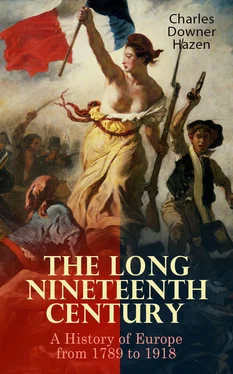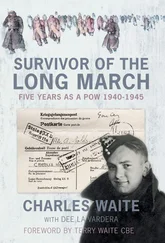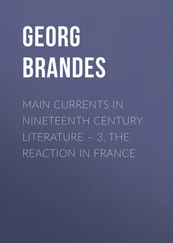Terror as a means of annihilating his country's enemies he approved. Terror as a means of oppressing his fellow countrymen, the crisis once passed, he deplored and tried to stop. He failed. The wheel was tearing around too rapidly. He was one of the tempestuous victims of the Terror. When he pleaded for peace, for a cessation of sanguinary and ferocious partisan politics, his rivals turned venomously, murderously against him. Conscious of his patriotism he did not believe that they would dare to strike him. A friend entered his study as he was sitting before the fire in revery and told him that the Committee of Public Safety had ordered his arrest. "Well, then, what then?" said Danton. "You must resist." "That means the shedding of blood, and I am sick of it. I would rather be guillotined than guillotine," he replied. He was urged to fly. "Whither fly?" he answered. "You do not carry your country on the sole of your shoe," and he muttered, "They will not dare, they will not dare." But they did dare. The next day he was in prison. In prison he was heard to say, "A year ago I proposed the establishment of the Revolutionary Tribunal. I ask pardon for it, of God and man." And again, "I leave everything in frightful confusion; not one of them understands anything of government. Robespierre will follow me. I drag down Robespierre. One had better be a poor fisherman than meddle with the governing of men." On the scaffold he exclaimed, "Danton, no weakness! " His last words were addressed to the executioner. " Show my head to the people; it is worth showing."
The fall of Danton left Robespierre the most conspicuous person on the scene, the most influential member of the Convention and of the Committee of Public Safety. He was master of the Jacobins. The Commune was filled with his friends, anxious to do his bidding. The Revolutionary Tribunal was controlled and operated by his followers. For nearly four months, from April 5 to July 27, he was practically dictator - a very singular despot for a people like the French.
His qualities were not those which have characterized the leaders or the masses of that nation. The most authoritative French historian of this period, Aulard, notes this fact. As a politician Robespierre was "astute, mysterious, undecipherable." "What we see of his soul is most repellent to our French instincts of frankness and loyalty. Robespierre was a hypocrite and he erected hypocrisy into a system of government."
He had begun as a small provincial lawyer. He fed upon Rousseau, and was the narrow and anemic embodiment of Rousseau's ideas. He had made his reputation at the Jacobin Club, where he delivered speeches carefully retouched and finished, abounding in platitudes that pleased, entirely lacking in the fire, the dash, the stirring, impromptu phrases of a Mirabeau or a Danton. His style was correct, mediocre, thin, formal, academic. 'Virtue' was his stock in trade and he made virtue odious by his everlasting talk of it, by his smug assumption of moral superiority, approaching even the hazardous pretension to perfection. He was forever singing his own praises with a lamentable lack of humor and of taste. "I have never bowed beneath the yoke of baseness and corruption," he said. He won the title of 'The Incorruptible.'
As a politician his policy had been to use up his enemies, and every rival was an enemy, by suggesting vaguely but opportunely that they were impure, corrupt, immoral, and by setting the springs in motion that landed them on the scaffold. He had himself stepped softly, warily, past the ambushes that lay in wait for the careless or the impetuous. By such processes he had survived and was now the man of the hour, immensely popular with the masses, and feared by those who disliked him. How would he use his power, his opportunity?
He used it, not to bring peace to a sadly distracted country, not to heal the wounds, not to clinch the work of the Revolution, but to attempt to force a great nation to enact into legislation the ideas of a highly sentimental philosopher, Rousseau. It was to be a Reign of Virtue. Robespierre's ambition was to make virtue triumphant, a laudable purpose, if the definition of virtue be satisfactory and the methods for bringing about her reign honorable and humane. But in this case they were not.
Robespierre stands revealed, as he also stands condemned, by the two acts associated with his career as dictator, the proclamation of a new religion and the Law of Prairial altering for the worse the already monstrous Revolutionary Tribunal. Robespierre had once said in public, "If God did not exist we should have to invent Him." Fortunately for a man of such poverty of thought as he, he did not have to resort to invention but found God already invented by his idolized Rousseau. He devoted his attention to getting the Convention to give official sanction to Rousseau's ideas concerning the Deity. The Convention at his instigation formally recognized "the existence of the Supreme Being and the Immortality of the Soul." On June 8, a festival was held in honor of the new religion, quite as famous, in its way, as the ceremonies connected with the inauguration, a few months before, of the Worship of Reason. It was a wondrous spectacle, staged by the master hand of the artist David. A vast amphitheater was erected in the gardens of the Tuileries. Thither marched the members of the Convention in solemn procession, carrying flowers and sheaves of grain, Robespierre at the head, for he was president that day and played the pontiff, a part which suited him. He set fire to colossal figures, symbolizing Atheism and Vice, and then floated forth upon a long rhapsody. "Here," he cried from the platform, "is the Universe assembled. O Nature, how sublime, how exquisite, thy power! How tyrants will pale at the tidings of our feast!" A hundred thousand voices chanted a sacred hymn which had been composed for the occasion and for which they had been training for a week. Robespierre stood the cynosure of all eyes, at the very summit of ambition, receiving boundless admiration as he thus inaugurated the new worship of the Supreme Being, and breathed the intoxicating incense that arose. Profound was the irony of this scene, the incredible culmination of a century of skepticism. Some ungodly persons made merry over this mummery, indulging in indiscreet gibes at "The Incorruptible's" expense. The power of sarcasm was not yet dead in France, as this man who never smiled now learned.
Two days later Robespierre caused a bill to be introduced into the Convention which showed that this delicate hand could brandish daggers as well as carry flowers and shocks of corn. The irreverent, the dangerous, must be swept like chaff into the burning pit. This bill, became the Law of 22d Prairial, made the procedure of Revolutionary Tribunal more murderous still. The accused were deprived of counsel. Witnesses need not be heard in cases where the prosecutor could adduce any material or "moral" proof. Any kind of opposition to the government was made punishable with death. The question of guilt was left to the "enlightened conscience" of the jury. The jury was purged of all members who were supposed to be lukewarm toward Robespierre. The accused might be sent before this packed and servile court either by the Convention, or by the Committee of Public Safety, or by the Committee of General Security, or by the public prosecutor alone. In other words, any life in France was at the mercy of this latter official, Fouquier-Tinville, a tool of Robespierre. The members of the Convention itself were no safer than others, nor were the members of the great Committee, if they incurred the displeasure of the dictator.
Now began what is called the Great Terror, as if to distinguish it from what had preceded. In the thirteen months which had preceded the 22d of Prairial 1,200 persons had been guillotined in Paris. In the forty-nine days between that date and the fall of Robespierre, on the 9th of Thermidor, 1,376 were guillotined. On two days alone, namely the 7th and 8th of July, 150 persons were executed. Day after day the butchery went on.
Читать дальше












